Fact: We spend about 90,000 hours over our lifetime at work, according to data published in Happiness at Work. In other words, we’re on the job for a shocking third of our life, so we owe it to ourselves to be comfortable there. A critical part of that? Creating a good work environment in which to thrive, focus, and hit our goals.
Contributing to a workplace environment that not only brings you joy but amps up your productivity is surprisingly easy. And you don’t need to be CEO to do it.
How Important is a Good Work Environment?

In short, pretty important.
While there are other things at work that contribute to our happiness and productivity—exciting projects, recognition, free snacks—your surroundings are pretty high on the list. In fact, a lot of how you feel at work depends on whether you have a positive work environment, research shows.
Additionally, your work environment is a huge driver of work performance and productivity, according to research. But only about 57 percent of employees feel their space allows them to work productively, according to a survey by Leesman, a guru of assessing workplace effectiveness.
So your workspace and its elements are pretty critical. Now, let’s dig into what exactly those elements are and what a good working environment even looks like.
What is the Ideal Work Environment?

Whether you work from an office building, hospital, or living room couch, it’s important to make sure of one thing: that you’re working from or in a space that makes you happy.
According to research at the University of Warwick, happiness caused a spike in productivity at work, while being unhappy did the opposite.
While physical space is important, we’re talking about more than just the area around you. The term work environment also refers to our mental and emotional surroundings. In other words, are we free to express criticism? Are we able to connect with our coworkers? Is our well-being important to the company? These are critical questions when determining if you’re in a good work environment already and how you might help to improve your current one.
To get there, there’s no need to renovate your entire office or flee your current role, we promise. Just a few simple tweaks can help you create a healthy work environment—and flourish like the boss you are. Here’s how.
1. Get comfortable
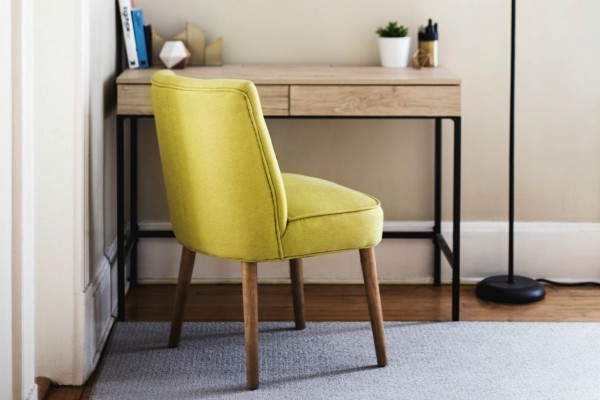
Productivity and comfort are connected, research shows. And that makes sense. After all, how can you work if your back is aching from that poorly functioning desk chair? Or you’re going cross-eyed from staring at the screen for too long? Here are some ways to make your work environment simply more comfortable.
- Adjust the temps. The Occupational Health and Safety Administration (OSHA) says between 68–76 degrees is ideal for the workplace. If you’re constantly too cold at the office, speak up. Chances are, the facilities team can help. And if all else fails, keep an extra sweater or a blanket in a desk drawer.
- Opt for a standing desk. These can boost productivity and work performance, according to a study published in the British Medical Journal.
- Get the right chair. With so many of us sitting for a living, it’s important to invest in a good ergonomic chair, which can ease back pain, improve blood flow, and ultimately make you feel your best.
2. Go phone free

Phones are hurting our productivity and mental clarity. We know: Shocker. But how much is actually pretty surprising.
The mere presence of your phone on your desk, even if it’s off, can “reduce available cognitive capacity,” according to a 2017 study in the Journal of the Association of Consumer Research. Translation: Your brain isn’t all there for the work in front of you. The study authors refer to this phenomenon as “brain drain,” which is immensely fitting.
Try these tips for staying off your phone at work:
- Allot yourself phone dates. Designate specific times you’re “allowed” to check your phone—e.g., every time you finish a task, right before lunch, precisely 3:06 p.m., etc. Phone time will start to feel rewarding and motivate you to get work done before your Insta-scroll break.
- Check-in with yourself first. Right before you pick up your phone, think about what exactly you’re trying to accomplish at that moment. Is answering your last email more important? Scanning that document your coworker just sent you?
- Hide it away. Place your phone in a drawer or in the other room and set a timer for when you’re allowed to retrieve it. We promise it’ll still be waiting for you, 86 notifications and all.
3. Get your noise on—kind of

There’s a sweet spot when it comes to noise levels at work. Ambient noise of about 70 decibels (read: sitting in a bustling coffee shop) can spur creativity, according to a study published in the Journal of Consumer Research. Moderate background noise is just enough to help your brain brew up ideas without breaking your focus.
What doesn’t work: Noise louder than 85 decibels (roughly the sound of a blender), which can be distracting, or complete silence, depending on your task. If you’re looking for creativity, silence isn’t helpful. If you want to sharpen your focus, keep the sounds off.
Here are some quick ways to embrace ambient noise:
- Head to your local café. The study found the background noise in a coffee shop was the perfect level of ambient noise to boost creativity.
- Listen to music without vocals, which can boost your mood and performance while you work.
- Keep the TV on at a low volume in the background, if you work from home.
4. Sniff away stress

Smell is one of our strongest senses, and research suggests that it can affect our moods and our work performance due to previous associations we have with certain scents.
If you work in an office, you probably can’t bring in your aromatherapy oils (or at least, you probably shouldn’t). Here are some things you can use to reap the benefits of scent in your work environment, without making everyone around you sneeze:
- Coffee. If you’re a java lover or at least associate coffee with an uptick in energy, the aroma of coffee alone has the power to improve your focus and ambition at work, say researchers at Monash University in Australia and Toronto University in Canada. Brew a cup even if you don’t have any intentions of drinking it (though that definitely helps productivity, too).
- Rosemary. One study published in Psychiatry Research found rosemary helped significantly decrease the stress hormone, cortisol. Pack a sprig in your lunch.
- Lemon. Whether you add it to your tea or squeeze it over your salad, get some lemon in your workday. Why? People working on computers made 54 percent fewer typing errors when the workplace was scented with lemon, according to a study by Japanese fragrance company Takasago.
On the opposite end of the spectrum, bad smells can distract you. So if your office is undergoing a paint job or a coworker just reheated their fish, move to a different spot.
5. Get in touch with nature
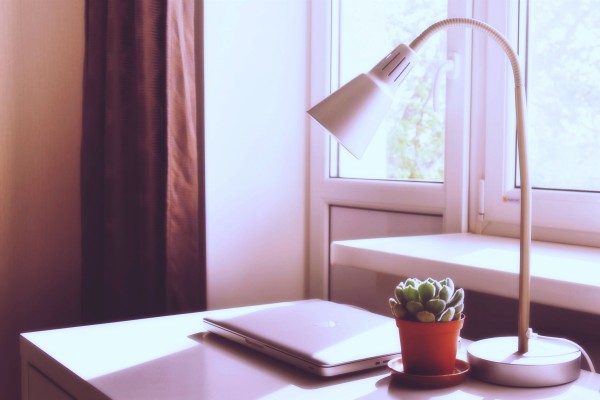
Besides looking great on your desk, being surrounded by plants and flowers can help spark creativity and boost productivity, a study by Texas A&M University researchers found.
If you want to get really specific, get your desk a rubber palm, fern, or dwarf palm. NASA says these are among the best types for filtering the air, though most leafy greens will do. (Yes, you can definitely buy all of these via Amazon.)
Another natural wonder for your brain? Daylight. In daylight-heavy offices, a recent study found that natural light helped significantly with people’s headaches, drowsiness, and eyestrain. Plus, researchers at Cornell say exposure to natural light can even increase productivity.
Get more natural light by:
- Investing in a sun lamp, which imitates outdoor light.
- Moving your work near a window, or working outside if possible.
- Replacing bulbs in your office with ones designed to mimic natural light.
- Getting sheer curtains (if you work at home), which allow light to filter through.
6. Embrace (a little bit of) clutter
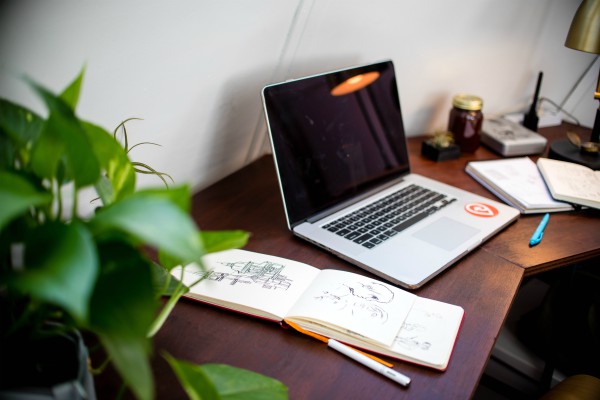
Albert Einstein once said, “If a cluttered desk is a sign of a cluttered mind, of what, then, is an empty desk a sign?” Einstein was always onto something, wasn’t he?
A little bit of clutter can actually go a long way in helping you tap into your creativity, says a study published in Psychological Science. That’s not to encourage you to keep old coffee mugs and scattered papers on your desk at all times. There’s a sweet spot: Major clutter can stress you out and distract your mind.
There are, of course, lots of benefits to keeping your workspace organized (the ability to focus better, more easily find what you’re looking for, and not accidentally throw out papers you need). But there’s a time and place for both.
Pro tip: Try pulling an Austin Kleon—a writer who set up two workspaces: A messy one for when he needed to be creative and an organized one for more busy work.
7. Surround yourself with others
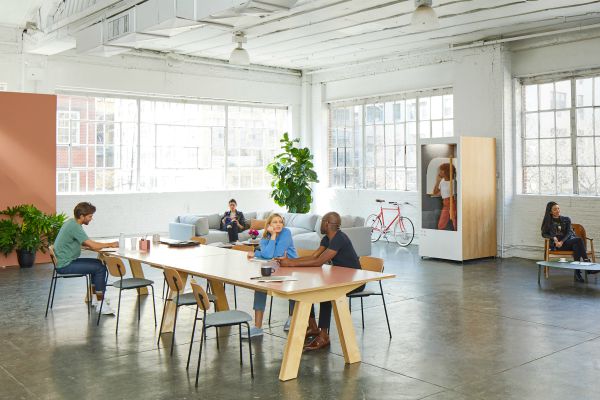
Some of us spend the better half of our day trying to find a quiet moment to get work done. But research shows we actually do better when we’re in close proximity to other people—even if we’re not working directly with them.
In 1920, social psychologist Floyd Allport performed a famous study that found that people working individually, but seated at a table with others, were more likely to excel on their tasks.
This phenomenon still reigns true today, but you can’t just sit next to anyone. They have to be competent workers: Research from Cornerstone OnDemand and Harvard Business School suggests that sitting next to someone with a complementary work style can help with productivity.
Work solo? Schedule work dates with another remote buddy—someone on the same wavelength as you.
To sum it all up…
Creating a good work environment comes down to a variety of factors—things like getting natural light, surrounding yourself with people, using noise to your advantage, and prioritizing your comfort. Even if you’re not in charge of the office set-up overall, you can make small tweaks to ensure your workspace, both physical and emotional, is as healthy as possible. After all, a healthy workspace is a productive one.
Your turn: What are your tried and true ways to cultivate a good work environment? Tell us about it in the comments.
For more ways to feel good in your workspace, check out our tips for staying positive on the job.
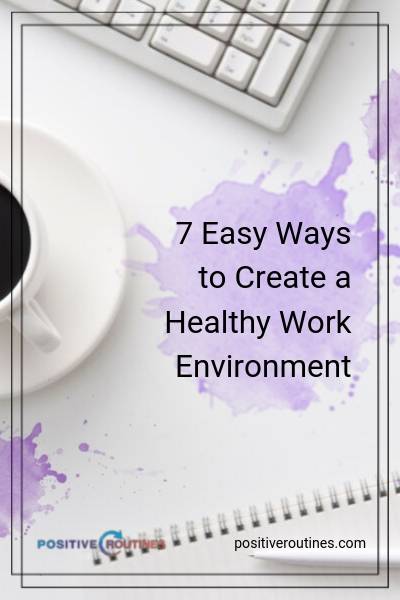

 Mohammed babeer says
Mohammed babeer says
November 20, 2019 at 12:37 amI found the Rosemary drink very interesting. Actually I,m a student ,however I’ll graduate after two months form now so I really found this tips informative thank you very much .
 Chelsey Taylor says
Chelsey Taylor says
November 20, 2019 at 2:19 pmThanks for commenting, Mohammed! Take a look at some of our other ways to stay healthy and happy on the job.
https://positiveroutines.com/making-friends-at-work/
https://positiveroutines.com/positive-mindset/
https://positiveroutines.com/happier-at-work/